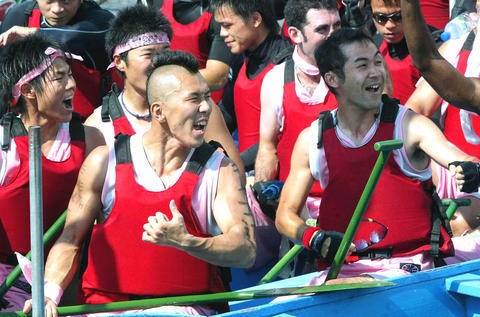This year's Taipei International Dragon Boat Championship was gripped by controversy yesterday after a disaffected dragon boat team positioned its canoe in the middle of the race course on Keelung River and then jumped ship to further disrupt the race, participants said.
Pandemonium broke out yesterday morning after the co-ed dragon boat team from National Taiwan Normal University's Mandarin Training Center (MTC) were demoted from the "winners' bracket" to that of "losers" because a team member had failed to properly wear his life vest, MTC rower Eric Chou said.
"We won our races on Sunday and participated in a ceremony that night thinking we'd won," said Chou, a US student studying Chinese at MTC.

PHOTO: LIN CHENG-KUNG, TAIPEI TIMES
In the second day of races yesterday, however, organizers informed the center's coed team that its exploits the day before were annulled, and that it had been bumped down into the losers' bracket.
"They whited out our scores," Chou said, "and there wasn't any immediate explanation why."
Enraged by the mysterious retroactive scoring, the MTC team, known for its competitive spirit, decided to use its race in the losers' bracket to send a message to organizers, Chou said by telephone.
"We rowed to the middle of the course and stopped, blocking [other teams]," he said.
When a throng of motorboats roared over to tug their canoe ashore, the rowers then jumped ship and "floated around for a little bit," he said.
The rowers' main gripe, Chou said, was that organizers offered no explanation for annulling their winners' bracket placement until after the team's river plunge.
"They told us only after all this that one of our teammates' life vests hadn't been properly buckled on Sunday," he said.
Taipei Sports Office director Liang Yung-fei (梁永斐) conceded yesterday that the failure to immediately explain the demotion to the team was an "oversight" that would be "reviewed in the days ahead."
But, Liang said, jumping into the river to protest is in clear violation of the race rules, as is not properly wearing life vests. The rules were made clear in an orientation preceding races, he said.
Organizer Wu Chin-sheng (
"We don't need to inform you," he said.
Held annually at the Dragon Boat Festival at Dajia Riverside Park in Taipei, the dragon boat races pit foreign and local teams against one another in three days of intense competition.
The MTC teams are known for practicing daily for months before the competition and typically advance to the winners' bracket matches every year, MTC teacher Sun Yih-fen (

MISINFORMATION: The generated content tends to adopt China’s official stance, such as ‘Taiwan is currently governed by the Chinese central government,’ the NSB said Five China-developed artificial intelligence (AI) language models exhibit cybersecurity risks and content biases, an inspection conducted by the National Security Bureau (NSB) showed. The five AI tools are: DeepSeek, Doubao (豆包), Yiyan (文心一言), Tongyi (通義千問) and Yuanbao (騰訊元寶), the bureau said, advising people to remain vigilant to protect personal data privacy and corporate business secrets. The NSB said it, in accordance with the National Intelligence Services Act (國家情報工作法), has reviewed international cybersecurity reports and intelligence, and coordinated with the Ministry of Justice Investigation Bureau and the National Police Agency’s Criminal Investigation Bureau to conduct an inspection of China-made AI language

LIMITS: While China increases military pressure on Taiwan and expands its use of cognitive warfare, it is unwilling to target tech supply chains, the report said US and Taiwan military officials have warned that the Chinese People’s Liberation Army (PLA) could implement a blockade within “a matter of hours” and need only “minimal conversion time” prior to an attack on Taiwan, a report released on Tuesday by the US Senate’s China Economic and Security Review Commission said. “While there is no indication that China is planning an imminent attack, the United States and its allies and partners can no longer assume that a Taiwan contingency is a distant possibility for which they would have ample time to prepare,” it said. The commission made the comments in its annual

CHECKING BOUNDARIES: China wants to disrupt solidarity among democracies and test their red lines, but it is instead pushing nations to become more united, an expert said The US Department of State on Friday expressed deep concern over a Chinese public security agency’s investigation into Legislator Puma Shen (沈伯洋) for “secession.” “China’s actions threaten free speech and erode norms that have underpinned the cross-strait ‘status quo’ for decades,” a US Department of State spokesperson said. The Chongqing Municipal Public Security Bureau late last month listed Shen as “wanted” and launched an investigation into alleged “secession-related” criminal activities, including his founding of the Kuma Academy, a civil defense organization that prepares people for an invasion by China. The spokesperson said that the US was “deeply concerned” about the bureau investigating Shen

‘TROUBLEMAKER’: Most countries believe that it is China — rather than Taiwan — that is undermining regional peace and stability with its coercive tactics, the president said China should restrain itself and refrain from being a troublemaker that sabotages peace and stability in the Indo-Pacific region, President William Lai (賴清德) said yesterday. Lai made the remarks after China Coast Guard vessels sailed into disputed waters off the Senkaku Islands — known as the Diaoyutai Islands (釣魚台) in Taiwan — following a remark Japanese Prime Minister Sanae Takaichi made regarding Taiwan. Takaichi during a parliamentary session on Nov. 7 said that a “Taiwan contingency” involving a Chinese naval blockade could qualify as a “survival-threatening situation” for Japan, and trigger Tokyo’s deployment of its military for defense. Asked about the escalating tensions